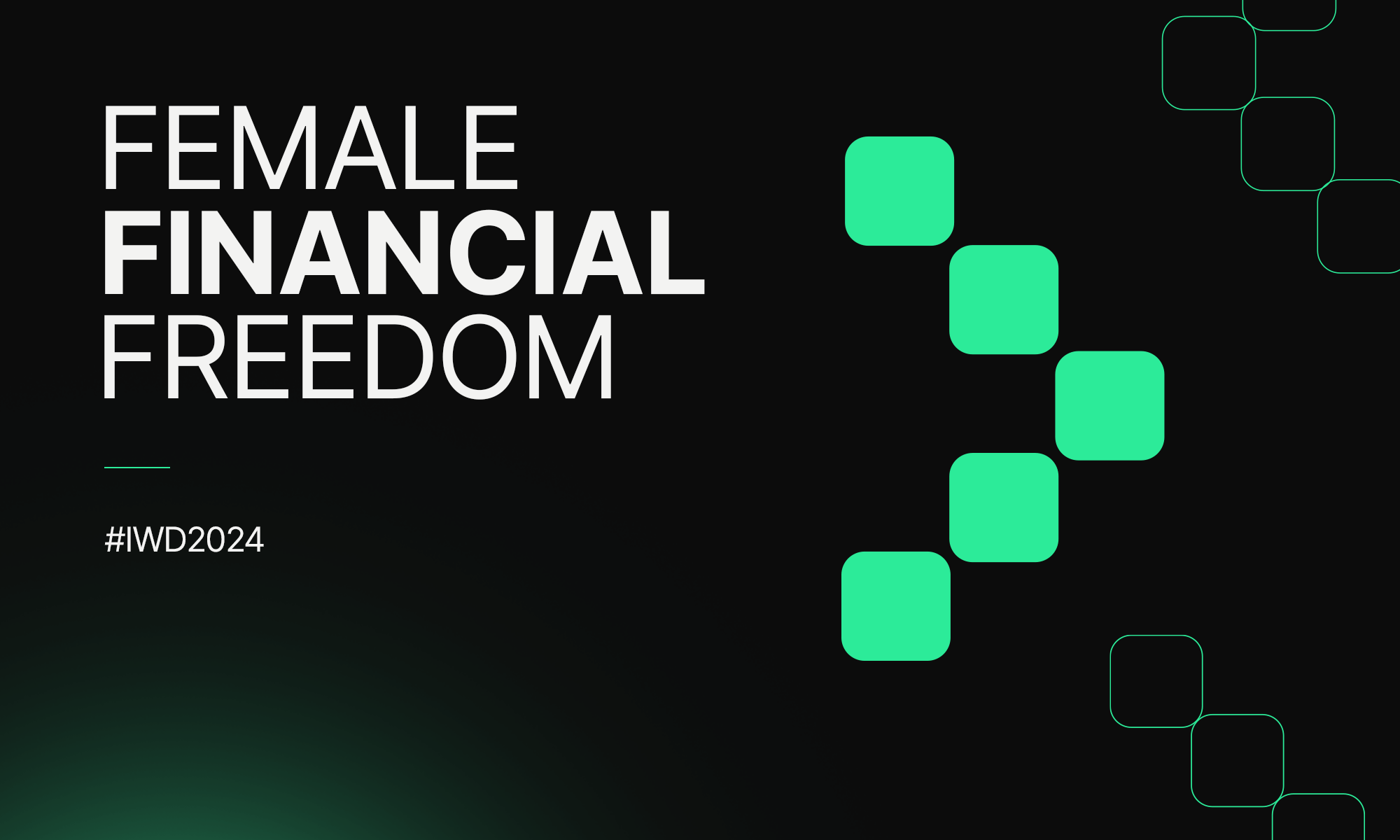What does financial freedom mean for women?
Wealth that is not inherited needs to be earned in some way and many roads lead to success—or failure. Finding work can be fairly easy, but being able to create financial freedom may be very difficult due to many different factors such as the high cost of living in many parts of the world or little to no access to education. There are structural barriers like social background, racism or other types of discrimination that just don’t allow everyone equal participation in wealth building.
But let’s say, the fictional Jake manages to land a well-paid job, he may either have already received financial education from his family or school or he may start seeking it at this point. In Jane’s world, however, investing and bull runs just seem too risky, too loud and Alpha male or too nerdy as may be the case for cryptocurrencies. So while many men enter a stage where they try to figure out how their money can make them more money, many women do not see themselves running with the bulls (it does not sound very enticing to be fair!) even though this could be their ticket to wealth building.
To combat historical inequalities and notions such as “investing is for boys” we need to make sure women obtain financial knowledge and combat the notion that the financial world is a world they don't belong to. This type of reframing is crucial for closing the gender wealth gap and enabling them to take control of their financial futures.
It involves promoting financial literacy, encouraging entrepreneurship, and advocating for gender equality in the workplace and financial sector, while at the same time assuring them that they don’t need to become like men to participate. Femininity and investing don't exclude but complement each other.
Don’t wait for Prince Charming to invest
This is a powerful message as it advocates for women's financial empowerment and independence. Though women may have their own buying power and agency, traditional roles still persist and surprisingly, phrases like “my boyfriend/husband takes care of our investments” are still very common.
When it comes to investing and cryptocurrency, many women rely on their partners to do the research. They may think it is too complex, too risky, too boring or all of the above! Of course, this does not go for all women, but it’s still prevalent.
In the past, women were portrayed as passive recipients of financial support, waiting for a partner or external saviour to secure their financial future. Unfortunately, this outdated narrative works to undermine women's agency and autonomy. Now, women are encouraged to take control of their finances and pursue investment opportunities independently.
Investing is a critical tool for wealth accumulation and long-term financial success. Whether it's saving for retirement, building a nest egg, or pursuing financial goals, investing offers the opportunity to grow your assets and secure your financial futures. By taking an active role in investment decisions, women can harness the power of compounding returns and leverage their resources to achieve their financial aspirations.
Moreover, investing ultimately works to empower women. By cultivating financial literacy and confidence in investing, women can challenge stereotypes and assert their independence in the realm of finance. Investing is not just about generating returns; it's about reclaiming agency, autonomy, and control over one's financial destiny.
There are various avenues for women to start investing, from traditional stocks and bonds to alternative assets like real estate, cryptocurrencies, or socially responsible investments. By educating themselves about different investment options, assessing risk tolerance, and setting clear financial goals, women can embark on their investment journey with confidence and purpose.
The phrase "Don't wait for Prince Charming to invest" is a call to encourage women to break free and embrace their financial power, take ownership of their financial futures, and chart their path to prosperity. There are many resources out there for beginners trying to break into the world of bull runs and Bitcoin halvings. Here the two C’s are important (and we don’t mean Coco Chanel!)—curiosity and confidence.
Money and feminism
As we have briefly explored, money and feminism intersect in complex ways, reflecting broader societal dynamics surrounding gender, power, and economic equity. Feminism, as a social and political movement advocating for gender equality, challenges traditional norms and structures that perpetuate gender-based disparities, including those related to wealth and financial resources.
Financial literacy and education play a crucial role in feminist approaches to money. Therefore, women should be equipped with the knowledge and skills to manage their finances effectively. Feminism seeks to empower women to make informed decisions about their economic futures. This includes understanding concepts such as budgeting, saving, investing, and retirement planning, as well as navigating financial institutions and systems.
We need to address the elephant in the room—women often still earn less than their male counterparts. One reason for this amongst many others is that negotiating is not a skill that was instilled in women traditionally. A study conducted by Harvard University concludes:
“Gender differences in salary negotiations may also be an important determinant of existing gender differences in labour market outcomes. Over the past two decades, laboratory and survey evidence has suggested that men are significantly more likely to engage in salary negotiations than women.”
Even though women possess the same skill level as their male counterparts, men will achieve better outcomes when engaging in negotiation. A value such as assertiveness typically associated with successful negotiation, is a trait more aligned with societal expectations for boys and men, who have been raised to be competitive, assertive, and profit-driven. Girls and women on the other hand are often encouraged to prioritise accommodating others and being altruistic. Consequently, women may feel hesitant to advocate forcefully for their own interests, especially considering evidence suggesting that doing so may lead to social backlash in the workplace and women being called rude or hard to work with.
Ultimately, financial feminism seeks to challenge the status quo and create a more equitable and inclusive financial system that benefits everyone. By centering the experiences and voices of women, financial feminism aims to transform the way we think about money, wealth, and power, and advance gender equality in all aspects of society.
Why don't women invest?
Despite advancements in gender equality, there’s a significant gender gap in investment participation, with many women seemingly hesitant to enter the world of investing. Several factors contribute to this disparity, reflecting broader societal attitudes, structural barriers, and individual circumstances.
Studies indicate that women tend to be less confident in their financial knowledge and may feel intimidated by complex investment concepts. So without adequate education and support, women may perceive investing as inaccessible or risky, leading them to avoid it altogether.
Additionally, cultural and societal norms play a role in shaping women's attitudes towards investing. Traditionally, women have been socialised to prioritise caregiving and household responsibilities over financial matters, resulting in a lack of exposure to investing and financial independence. Moreover, persistent gender stereotypes portray investing as a masculine domain, further deterring women from taking an active role in managing their finances.
Structural barriers can also contribute to the gender gap in investing. Women may face obstacles such as wage disparities, limited access to employment opportunities, and caregiving responsibilities that disproportionately affect their financial stability and ability to invest. Furthermore, women often encounter systemic biases and discrimination in the financial industry, which can undermine their confidence and deter them from seeking investment advice or support.
Addressing the gender gap in investing requires a multifaceted approach that addresses systemic barriers that promote financial education and challenge gender stereotypes. We can all play a part here, fathers by educating their daughters, schools by introducing this topic early on and us women – by taking a leap and making investing our own.
Women who did invest
The inspiring females listed below have helped revolutionise the world of finance with their significant contributions and paved the way for the next generation of women to come.
Viola Turner
Viola Turner was a pioneering figure in the world of finance, known for her expertise in investment management. She began her career as a secretary at an investment firm and quickly rose through the ranks, eventually becoming one of the first female investment analysts on Wall Street. Turner's keen insights and analytical skills earned her recognition and respect in the male-dominated field of finance, and she paved the way for future generations of women in the industry.
Geraldine Weiss
Geraldine Weiss was a trailblazing investment analyst and author known for her groundbreaking work in dividend investing. She founded Investment Quality Trends, a newsletter focused on identifying undervalued stocks with strong dividend yields. Weiss's investment approach, which prioritised long-term value and income generation, resonated with investors seeking stable returns in volatile markets. Her contributions to the field of finance helped democratise investing and empower individual investors to achieve financial success.
Catherine Wood
Catherine Wood is a prominent figure in the world of disruptive innovation investing. As the founder and CEO of ARK Invest, Wood is known for her forward-thinking investment strategies focused on revolutionary technologies such as artificial intelligence, genomics, and blockchain. Wood's bold predictions and investment decisions have earned her widespread acclaim and positioned ARK Invest as a leader in thematic investing. She continues to advocate for innovation and growth opportunities in the global economy, inspiring investors to embrace change and adapt to new market realities.
Muriel Siebert
Muriel Siebert was a pioneering figure in the financial industry, breaking barriers as the first woman to own a seat on the New York Stock Exchange. Known as "The First Woman of Finance," Siebert was a trailblazer for women in a male-dominated industry and a fierce advocate for gender equality. She founded her brokerage firm, Muriel Siebert & Co., and dedicated her career to promoting financial literacy and empowering women to take control of their financial futures. Siebert's legacy continues to inspire generations of women to pursue careers in finance and investing, leaving an indelible mark on the industry.
Leadership, female empowerment and sensitivity
The solution to achieving financial empowerment is not to become like men – to wear pants and hide our emotions. We can still wear the dress, a cute one at that, and we can and should be proud of our feminine traits. It is not a disadvantage to feel, to have empathy and to follow a more considered rather than risky approach, it is a strength.
In fact, it can help when investing. By being more careful and rather following a buy-and-hold approach women tend to experience fewer losses and setbacks. Two studies have shown that women even make better investors. The Warwick Business School study analysed 2,800 investors over three years. Female investors achieved a return of 1.94%, compared to 0.14% for male investors and 1.80% above the FTSE 100. These findings suggest that, on average, women outperform men in investment performance, surpassing the market index.
Being vulnerable is a superpower and won’t hinder females on the path to achieving financial success. We simply need to understand that it is not the same as people-pleasing and being assertive does not mean being rude.
How can I get started?
There are many different investing strategies that have nothing to do with high-risk speculation and investing large sums. Dipping a toe into the investing pool can be a rewarding step towards building wealth and securing your financial future. Here are some simple steps to help you get started:
- Educate yourself: Get a grasp of the basics of investing. There are numerous resources available, including books, online courses, and reputable financial websites. You should familiarise yourself with key concepts such as asset classes, risk tolerance, diversification, and different investment vehicles. For lessons on personal finance, blockchain and Bitcoin basics, as well as more advanced crypto content, check out the Bitpanda Academy.
- Set financial goals: Clarify your financial objectives and investment goals. Are you investing for retirement, a major purchase, or long-term wealth accumulation? Understanding your objectives will help guide your investment decisions and asset allocation.
- Assess the risks: Determine your risk tolerance by considering factors such as your age, financial situation, investment timeframe, and comfort level with market volatility. Your risk tolerance will influence your asset allocation and investment strategy.
- Start small: Begin with a modest investment amount that you're comfortable with. Many online brokerage platforms offer low-cost or no-cost investment options, allowing you to start with as little as a few hundred dollars. Consider starting with a diversified portfolio of low-cost index funds or exchange-traded funds (ETFs) to minimise risk.
- Diversify your portfolio: Spread your investments across different asset classes, industries, and geographic regions to reduce risk and maximise returns. Diversification helps mitigate the impact of market fluctuations and enhances the stability of your portfolio.
- Stay informed: Stay updated on market trends, economic news, and investment opportunities. Monitor your investments regularly and make adjustments as needed based on changes in your financial situation or investment goals.
- Seek professional advice: Consider consulting with a financial advisor or investment professional, especially if you're unsure about where to start or how to navigate the investment landscape. A qualified advisor can provide personalised guidance and help you develop a customised investment strategy
Remember that investing involves risk, and there are no guarantees of returns. However, by taking a disciplined and informed approach, you can gradually build wealth and work towards achieving your financial goals over time.
Be part of the change
We should probably all talk more about wealth building and investing to make it a more mainstream topic. If you are a woman who invests, spread the word, and talk to your friends and family about it. There is still sometimes an archaic notion of not discussing money and that needs to change. We should share advice, clear up doubts and learn from each other. Building a culture, where questions are welcomed should be the ultimate aim – don’t forget, everyone is a beginner at some point.
If you are a woman and are interested in investing, but don’t know where to start, educate yourself and/or join a women's group and learn together! And remember, you can always start small and invest the same amount you would spend for a nice cup of coffee and a croissant.
Disclaimer
This article does not constitute investment advice, nor is it an offer or invitation to purchase any digital assets. This article is for general purposes of information only and no representation or warranty, either expressed or implied, is made as to, and no reliance should be placed on, the fairness, accuracy, completeness or correctness of this article or opinions contained herein. Investing carries risks. Make sure to conduct your own research before making any investment.
 Commodities* Invest in commodities 24/7
Commodities* Invest in commodities 24/7 BITCOIN What to know when you are just starting to invest
BITCOIN What to know when you are just starting to invest ASSET MANAGEMENT Your investment, your assets: Why your money is safe with Bitpanda
ASSET MANAGEMENT Your investment, your assets: Why your money is safe with Bitpanda COUNTDOWNBitcoin Halving Countdown 2024
COUNTDOWNBitcoin Halving Countdown 2024 ACADEMYWhat is the Bitcoin halving?
ACADEMYWhat is the Bitcoin halving?






